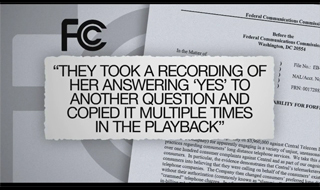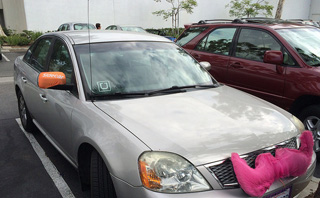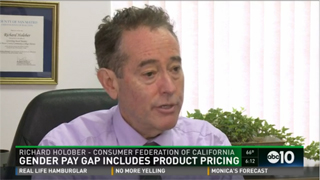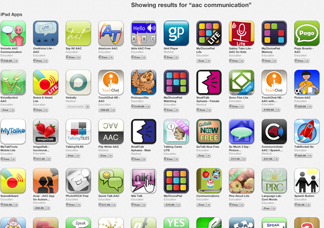Call Kurtis: Why You May Not Want To Say A Word During An Unexpected Call

In 2014 the Federal Communications Commission fined Central Telecom Long Distance $3.9 million, “For unjust, unreasonable and deceptive practices.” In one woman’s FCC complaint, she says the company took a recording of her answering “yes” to another question and copied it multiple times on the playback, which ultimately changed her preferred long distance telephone carrier without her authorization. “It’s definitely not honest, and a little shady, absolutely,” said Danielle Spang with the BBB. Read More ›
EFF Sues For Release Of Data On Decryption Requests
by Cheryl Miller, Recorder, San Francisco

Digital liberties group Electronic Frontier Foundation sued the U.S. Department of Justice Tuesday for documents that may shed light on how many times—if ever—the federal government has sought a secret court order forcing companies to decrypt consumers’ information. … The not-for-profit, following up on media reports about the government trying to obtain private source code, [previously] filed a FOIA request with the DOJ’s National Security Division requesting any applications to FISC for court orders seeking “technical assistance” in unlocking data. Read More ›
Online Payday Lenders Could Be Worse Than Traditional Payday Lenders
by Ashlee Kieler, Consumerist

Half of online payday loan borrowers incur an average of $185 in bank penalties because at least one debit attempt by lenders creates an overdraft or fails completely. … In addition to simply extracting money from borrowers’ accounts when payments are due, [the online system] allows lenders to attempt multiple debit transactions against borrowers’ accounts when the first attempt fails. Nearly 18% of borrowers experience multiple failed requests on the same day from the same lender. For an already financially strapped borrower, this can lead to hundreds of dollars’ worth of overdraft fees. Read More ›
The Risk On Your Wrist: Are Hackers Targeting Your Wearables Data?
by Donal Power, ReadWrite.com

“Health care providers and health plans have a gold mine of information that criminals can monetize – such as SSNs, health insurance information, and general health information,” [said an attorney focused on privacy and data protection]. … “The most concerning finding was to see that hacking/phishing/malware was the leading cause of incidents last year, especially the increase we saw in health care incidents,” [she] said. “We could feel the tide begin to turn in 2014, which continued into 2015. However, with the number of incidents we handle, it was surprising to see that was the leading cause.” Read More ›
Women’s Products That Cost More Than Men’s? It’s Called The ‘Pink Tax’, And Not Everyone’s Mad
by Teri Sforza, Orange County Register

Richard Holober, executive director of the Consumer Federation, said with exasperation that a Levi’s One Pocket Boyfriend Shirt has been marketed to women for $78. Their boyfriends, he said, could buy a nearly identical shirt for $48. “Add the word ‘boyfriend’ and put the shirt on a woman, and the price goes up by $30,” Holober said. “Businesses have figured out, through a lot of research, how to extract extra dollars by giving products a veneer of being designed especially for girls or women. But that’s not right.” Read More ›
Uber And Lyft Have Devastated L.A.’s Taxi Industry, City Records Show
by Laura J. Nelson, Los Angeles Times

Since the ride-hailing services began operating in Southern California three years ago, the number of L.A. taxi trips arranged in advance has fallen by 42%, according to city records, and the total number of trips has plummeted by nearly 30%. … The decline mirrors what’s happening across the country. … In San Francisco, the corporate home of both Uber and Lyft, the number of trips taken per taxi dropped by more than two-thirds over a two-year period. Read More ›
Gender-Based Price Differences Could Be Banned
by Allen Young, Sacramento Business Journal

Senate Bill 899 passed the Senate Judiciary Committee along party lines this week and now heads to the Senate floor. … Female consumers pay 7 percent more on average for products that are essentially the same as the male version, according to a study released in December by a public consumer watchdog agency in New York City. The study looked at 800 consumer products with “clear male and female versions” and found that products targeted toward girls and women were more expensive 42 percent of the time. Read More ›
SB 899 (Hueso) To End Gender Bias In Prices Passes Senate Judiciary Committee
[CFC press release:] SB 899 (Hueso), the bill sponsored by Consumer Federation of California (CFC) to end gender-based discrimination in retail pricing in California, passed in the Senate Judiciary Committee today by a vote of 5-1. All Democrats were in favor, including Chair Hannah-Beth Jackson, D-Santa Barbara, and … Read More ›
Gender Pay Gap Includes Product Pricing
by Gabrielle Karol, ABC10, Sacramento

The Consumer Federation of California sponsored [SB 899], which was authored by State Senator Ben Hueso (D-San Diego). The bill’s motivation is a December report from New York’s Department of Consumer Affairs. In the report, nearly 800 products are compared at two dozen different retailers. Forty-two percent of the time, women’s products are priced higher than men’s products. The so-called “pink tax” means shoppers are paying an average seven percent more for items targeted to women. Read More ›
Health Apps: Unlimited Promise Or ‘Like Having A Really Bad Doctor’
by Soumya Karlamangla, Los Angeles Times

More than 165,000 [apps] involving health and wellness [are] currently available for download — a blending of technology and healthcare that has grown dramatically in the last few years. Experts see almost unlimited promise in the rise of mobile medical apps, but they also point out that regulation is sometimes lagging the pace of innovation, which could harm consumers. … Federal regulators say certain higher-risk apps — such as those that perform EKGs or measure blood glucose levels — must be approved by the Food and Drug Administration before reaching the market. Apps considered less of a risk … won’t face much scrutiny from the FDA. Read More ›
Consumer Federation of California Sponsors SB 899 (Hueso) To End Gender Bias In Prices
SACRAMENTO – Consumer Federation of California is sponsoring SB 899 (Hueso) to prohibit businesses from charging customers different prices for substantially similar products on the basis of gender. The state Senate Judiciary Committee will consider SB 899 at 1:30 p.m. Tuesday, April 12. This chronic problem has … Read More ›
Uber Agrees To Settle DA Suits Over Safety Practices
by Jason Doiy, The Recorder

Uber Technologies Inc. will pay up to $25 million to settle a lawsuit brought by the San Francisco and Los Angeles district attorneys’ offices over how it has touted safety measures. … Uber agreed to change the way it describes its driver checks and safety practices and to cooperate with the Division of Measurement Standards to certify that ride charges are accurate and fair. [The complaint claimed] the San Francisco-based ride-hailing company misled consumers by advertising the “safest rides on the road,” coupled with “industry leading background checks.” Read More ›
Wells Fargo Must Pay $203M To Customers After Supreme Court Rejection
by Ashlee Kieler, Consumerist

In 2010, the judge in the case ordered the bank to pay the $203 million to customers of Wells Fargo who were affected by the overdraft policy between Nov. 2004 and June 2008. … At issue in the appeal to the Supreme Court was whether or not previous courts were right to certify the class action even though the class included individuals who were not harmed by the company’s conduct — in this case Wells Fargo allegedly making misleading statements to checking account customers about how their transactions would be posted and the likelihood that an overdraft would result. Read More ›